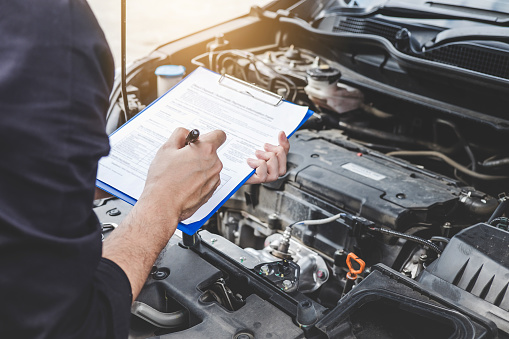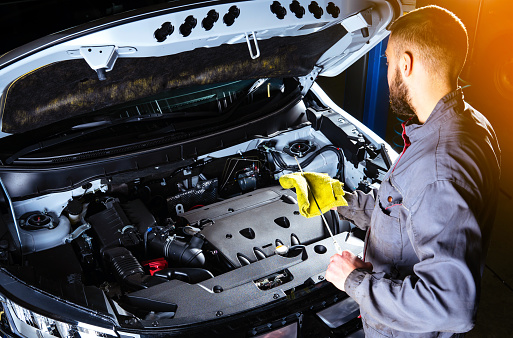March 1, 2025
7 car Maintenance tip’s for spring and Summer
- Check your tires: Spring and summer bring warmer temperatures, which can cause your tire pressure to fluctuate. Make sure to check your tire pressure regularly and keep them properly inflated. Also, check your tire tread depth and look for signs of wear or damage.
- Replace your wiper blades: Spring and summer rainstorms can make it difficult to see while driving. Check your wiper blades and replace them if they are worn or damaged. It’s also a good idea to clean your windshield regularly.
- Check your cooling system: Hot summer temperatures can put a strain on your car’s cooling system. Make sure your coolant level is topped off, and have your radiator and hoses inspected for leaks or cracks.
- Change your oil and air filter: Regular oil changes are important for maintaining your car’s engine. Spring is a good time to change your oil and air filter to keep your engine running smoothly.
- Inspect your brakes: Your brakes are essential for safety. Have your brake pads, rotors, and calipers inspected to ensure they are in good condition.
- Check your battery: Warm weather can cause your car battery to lose its charge quickly. Have your battery checked to ensure it’s holding a charge, and replace it if necessary.
- Keep your car clean: Spring and summer can bring pollen, dust, and other debris that can damage your car’s exterior. Regularly washing your car and keeping it clean can help protect the paint and prevent rust from forming.
Should vehicle maintenance be a habit?
Establishing a habit of regular maintenance can also help prevent unexpected breakdowns and extend the life of your vehicle. This includes checking fluid levels, tire pressure, brakes, and other essential components. By staying on top of routine maintenance, you can identify potential issues before they become more significant problems that can leave you stranded on the side of the road.
In summary, vehicle maintenance is crucial for the safety and longevity of your vehicle, and making it a habit can save you money, time, and headaches in the long run.
vehicle maintenance should definitely be a habit. Regular maintenance ensures that your vehicle runs smoothly, lasts longer, and can help prevent costly repairs down the road. Simple tasks like checking the oil, tire pressure, and brakes, along with scheduled services (like changing the air filter, rotating tires, or replacing spark plugs), can help improve your car’s performance and safety.
Making it a habit can save you time, money, and a lot of stress, especially since issues that are caught early are often much cheaper to fix. Plus, it can help with fuel efficiency and ensure your car remains reliable for longer!
Is maintenance important in life?
For example, we need to maintain our physical health by regularly exercising, eating well, and getting enough rest. Neglecting these areas can lead to health problems and a shorter life expectancy.
Similarly, we need to maintain our mental and emotional health by managing stress, seeking support when needed, and engaging in activities that promote well-being. Neglecting these areas can lead to mental health issues such as anxiety and depression.
Maintaining our relationships with family, friends, and colleagues is also important. We need to invest time and effort into nurturing these relationships to build strong connections and support networks.
Overall, maintenance is crucial in all aspects of our lives to ensure that we are healthy, happy, and productive. By making maintenance a habit, we can avoid larger problems down the road and enjoy a better quality of life.
![]() Why is maintenance better than repair?
Why is maintenance better than repair?

- Cost: Maintenance is often less expensive than repair. Regular maintenance can help prevent major problems from occurring, which can be more costly to fix.
- Time: Maintenance usually takes less time than repair. When you have a well-maintained vehicle or appliance, it is less likely to break down, saving you the time and hassle of dealing with repairs.
- Safety: Maintenance can help prevent accidents or injuries. For example, maintaining your brakes can help prevent a dangerous situation where your brakes fail, causing an accident.
- Reliability: Regular maintenance can improve the reliability of your vehicle, appliance, or other equipment. When things work well, you can count on them to function correctly when you need them most.
- Longevity: Proper maintenance can extend the life of your vehicle, appliance, or equipment. By taking care of it, you can avoid premature wear and tear, which can lead to replacement costs.
In summary, maintenance is better than repair because it can save you time, money, and potentially hazardous situations. By making maintenance a habit, you can extend the life of your belongings and enjoy a safer, more reliable experience.

